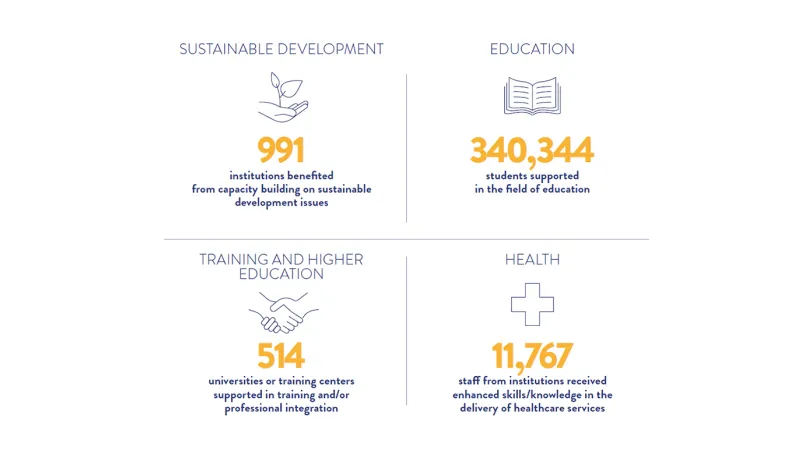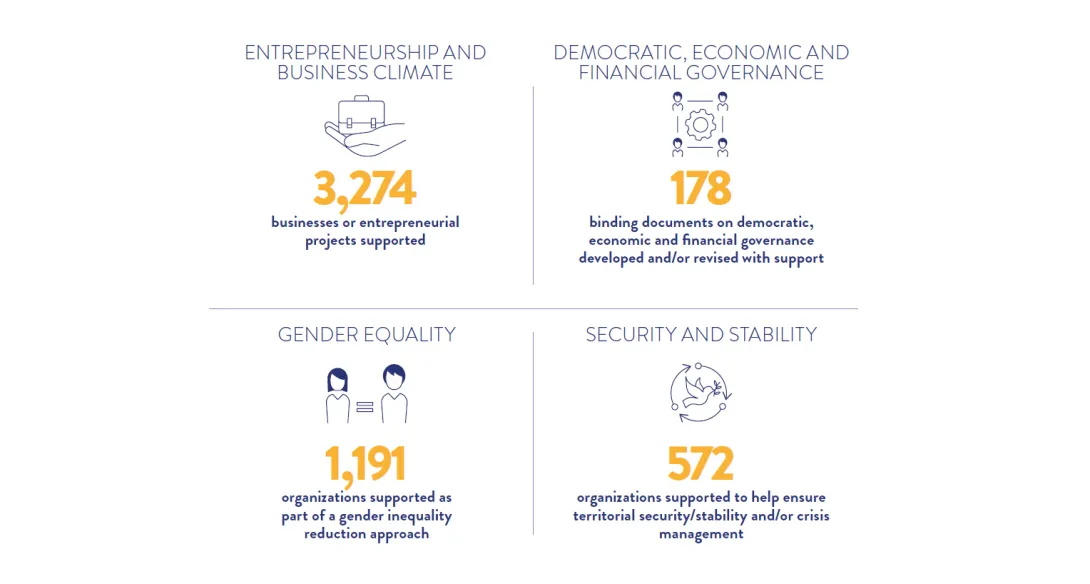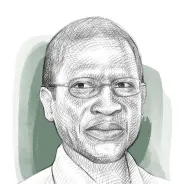Share the page
Measuring our impact

Every new project carried out with our partners aims to foster change and transformation. Our action is therefore driven by the assessment and measurement of the impact of our projects as well as our annual contribution to the Sustainable Development Goals (SDGs) across our focus areas in health, digital media, entrepreneurship, governance, and more. Discover our latest annual impact and results.
Expertise France 2024–2025 review and outlook video
Our methodology
We rigorously measure the impact of our actions across all focus areas. We also use our SDG commitments and our quality assurance approach, which ensures effective and responsible use of the resources entrusted to us by donors.
To do so, our teams use several tools:
- The Contract of Objectives and Means (COM). This is a document that outlines the strategic priorities and budget agreed between Expertise France and the French government. It sets out specific goals, indicators and targets for our agency.
- The project framework, which sets out shared values and best practices across Expertise France’s teams to ensure optimal results.
- The monitoring and assessment policy, which defines principles and standards for measuring and analysing our project outcomes and impact.
Our key performance indicators
2024 was a year of growth, with €800 million in new projects and a 15% increase compared to 2023. Two main tools are used to measure project impact:
THEMA indicators
For several years now, we have developed and strengthened how we manage internal and external accountability. We now have a robust system to collect, aggregate, analyse and report the results of each project.
We use 32 aggregate indicators across six main areas of action. These are cross-cutting focus areas such as gender equality as well as health; human development; peace, stability and security; democratic, economic and financial governance; and climate, biodiversity and sustainable development. Here’s a review of the impact of our work in 2024:
- Health: 11,767 health professionals in partner institutions received training to strengthen the quality of the healthcare services they deliver
- Entrepreneurship: 3,274 businesses received support
- Governance: 18,838 people received training
- Basic education: 340,344 students received support
- Gender equality: 550,205 people received training or targeted information about reducing gender inequalities
- Biodiversity: 11.7 million hectares under improved marine biodiversity management
- Security and stability: 572 organisations received support in crisis management and/or territorial stability/security

COM indicators
Our Contract of Objectives and Means with the French government translates our political priorities and strategies into objectives, indicators and targets. This resulted in the following outcomes in 2024:
- 125 local, national and supranational public institutions received support on issues related to climate, biodiversity, circular economy, chemicals, waste, energy, and water and sanitation. This led to the development, strengthening and implementation of public policies in favour of environmental protection and the fight against climate change
- 20% of new projects (by volume of funding) contributed to environmental goals
- 60% of new projects financed by the French government focused on gender equality
- 300 education and vocational training institutions received support
- 1,000 African-based very small businesses/SMEs received support
- 800 institutions received assistance in strengthening the rule of law, justice, human rights and public participation
- 50% of French-funded projects were carried out in Least Developed or fragile states
- 15% of revenue came from our in-country offices
How are these indicators collected?
The logical framework (logframe) approach was developed in the 1970s. It became the standard methodology among donors and other stakeholders in development cooperation by the late 1990s. This methodology presents project objectives in a logical, systematic manner, defines evaluation methods, and identifies external factors that may affect a project’s success.
Each project includes:
- Systematic evaluation of its expected contribution to sustainable development (biodiversity, climate, social cohesion, gender, etc.)
- Use of standardised tools and processes for effective and efficient project management
- Accountability mechanisms for regular reporting to recipients, partners, donors and the public
- Evaluation and knowledge-sharing exercises to analyse where current and finished projects succeed or fail so as to improve future project impact
- Audits to certify fund usage complies with donor regulations
“Expertise France’s support in terms of business creation and my opportunity to join the Kedge Business School incubator were major assets. I was able to better understand the business I want to launch and fine-tune my business plan. What I love about this programme is that it connects all Comorian entrepreneurs who’ve received advice and support from Expertise France. The knowledge we were able to share with each other was invaluable and sparked off new ideas.”
- Comorian diaspora member and founder of Ushesa, a platform that connects home help professionals with members of the diaspora.

“With our partners’ support, we went from 33 to 480 ambulances. This was a major boost in terms of our transport capabilities. In terms of Expertise France, we received training in epidemiology so that we can respond to emergencies more effectively.”
- former Secretary General, Guinea Ministry of Health and Public Hygiene

Key figures
- 991 institutions received assistance in strengthening their capacities in the area of sustainable development
- 514 universities and training centres received assistance in delivering professional and vocational training
- 1,487 institutional staff undertook capacity-building training to improve their knowledge and management of legal issues
- 7,571 institutional staff undertook capacity-building training to improve their knowledge and competencies in crisis management and territorial security/stability
